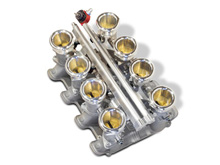I would ask him what size and brand carb should I run on a future 350 SBC in a 3rd gen Camaro for auto-x, occasional track days, and some daily driving. I would need excellent throttle response and good torque.
I would ask him what size and brand carb should I run on a future 350 SBC in a 3rd gen Camaro for auto-x, occasional track days, and some daily driving. I would need excellent throttle response and good torque.
Basil Exposition wrote:Hungary Bill wrote: Question for a Weber expert: "Why Weber?" I like Webers, but why did the expert choose Weber as the focus of their attention? "What makes a Weber a Weber?" Personally I think of Weber as a "step above" the rest. What gives it that little "extra"?Now THAT's a good question. I often see SU's replaced by Webers on British machines, but then I hear that SU's are great carbs and the Webers have issues. So which is best and why?
SUs (and any other constant depression carb, except for some of the smogged ones like the late Stromberg CDSE) are very good carbs and give excellent service, being able to accommodate altitude change, for instance, better than any fixed venture carb. They aren't even hard to tune once you know what you are doing - many/most things that get blamed on the SU are due to people assuming it must be the carbs when the engines run rough and that's the first place they start meddling instead of going for ignition.
I love carbs (have 10 throats of American, 5 SUs, ad 8 DCOE Webers in the current fleet, along with 3 injected cars). But the facts re that injection is more efficient, reacts quickly to changes that a carb can't respond to unless manually retuned, and can have as much power as any carb will supply, along with better fuel mileage. And the reason why engines that used to need rebuilds every 100,000 now go 2-3 times that mileage is that injection doesn't wash down the cylinder walls with too much fuel under starting conditions. Hard to argue with.
Not giving up my carbs any time soon, but every time I tune them I can't help thinking about how painless injection is.
Webers are among the most accurate fuel/air metering devices extant (some expert tuners opine that Dellortos are even more accurate) and they will live on a long time in the vintage hobby market. I wonder if the disinclination for old car hobbyists to try injection is mostly fear of learning something new? It isn't that hard any more, with several after market options for the enthusiast. Maybe if more of those were patterned after the ones that look like carbs.
This looks pretty nice to me (for LS Chev engines):

You'll need to log in to post.